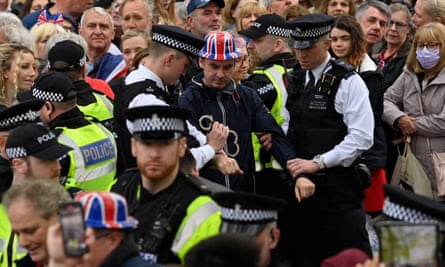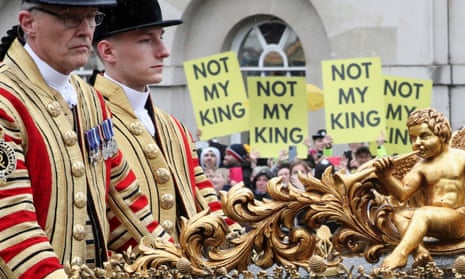The king never said: “Who will rid me of this troublesome republican?” Of course he didn’t. No doubt he wrung his hands with woe at the sheer idiocy of the police arresting the head of Republic, Graham Smith, and others as they unloaded harmless “Not My King” placards on the morning of the coronation. What a gift to their cause. A letter from the Met had warned them “tolerance will be low”, but it never said it would be at absolute zero under the new anti-protest laws.
The homemade sign that may have captured the mood of many read simply: “Don’t you think this is a bit silly?” Oh, but this is what we do so well! We invite the world to see us in our lavishly gilded splendour; parading the largest military display for 70 years, as the commentators boasted over and over, so that no visitors would guess our army is a fifth of its size at the last coronation.
The greater the pageant, the more there is to disguise the emptiness of its meaning. All hail to Ruritania at its most gloriously silly!
Self-deceiving, preposterously vacuous, this is what Walter Bagehot famously dubbed the “dignified” part of the constitution, but that was back in the high days of empire. The empire is still just about there, as the king donned not only the robe of righteousness, but the “imperial mantle” over his golden supertunica. Is all this harmless “tradition”? Until now so much of this empty parody and pretence has stranded us in the realms of an idealised past. All ex-empires, the historian Linda Colley writes today, suffer grievance over lost greatness, which she says, helps explain “why so many voters in post-imperial Britain were persuaded by the case for Brexit”. The phantasm of monarchy and golden orb strives to keep alive dreams of supremacy we should have let go long ago.

No other European monarchs risk such fantastical charades as this. Wiser and humbler, they do like Queen Margrethe II of Denmark who was proclaimed queen from the balcony of her palace by the prime minister, or King Carl XVI Gustaf of Sweden, who chose not to be crowned but simply took office during a meeting of the cabinet. Not so our “modernising” king who went for the full alleluias, alongside the much-mocked homage pledging allegiance from us, not to us, despite all that we give him. But every extra word of praise, every extravagant eulogy from an archbishop who should have known better, only made the wretched man in the crown look more lamentable.
As for the anointing by the holy spirit with the chrism from Jerusalem marking the moment of divine intervention, that magic rightly happens behind a special Wizard of Oz screen to hide the nothingness there. What on earth do most people make of it? This majority non-Christian country may be taken aback by the unfamiliar sights and sounds of the ineffable nonsense of supernatural religion blended with mystical monarchism in this bizarre ceremony. This is us? Really? Surely no longer. The latest census showed shamanism is the fastest-growing religion, so maybe what suits the wicca pagan suits the devout royalist just as well. All the paraphernalia and regalia, spoon, glove, bracelets and the magic ring that is the “covenant sworn this day between God and king” left the man in the oversized precarious crown looking, well, a bit embarrassed.
Though our allegiance was sworn “to his heirs and successors according to law”, you might look at those coming after and think, no, surely this can’t last that long. Will they inherit that ever-swelling £2bn royal wealth derived from colossal tax-free hereditary property firms and share portfolios with dividends multiplying yearly? The Guardian’s exploration of their secrets, deeper far than that mystery behind the screen, has revealed their unmerited riches, far greater than other European monarchs. Does that deserve reverence? But you could say in this at least the monarch is a true symbol of a country grown more unequal, its richest soaring upwards even as most incomes plunge down as never before. Heritage is a fine thing but that’s not the same as inheritance, which does the damage in a country where birth is becoming destiny more, not less than before.
Consider those politicians in attendance who pay lip service to “social mobility” with a straight face, while celebrating this anointing of monumental and perpetual immobility. The monarchy is by no means the worst excrescence of our failing constitution, with its House of Lords and its crooked electoral system, but today’s extravaganza stands as a psychological obstacle to radical political reform.
The government – Penny Mordaunt with her sword of truth, forsooth – may have been giving thanks. This has been a good day to bury the very bad news of the local election results for at long last the country seems to be on the move, the Conservative era drawing to an end, unforgiven for the mayhem that the crown is supposed to “stabilise”.
after newsletter promotion
For all the coronation’s glorious flummery that may delight the eye and ear, I have a suspicion many of those who paid attention to the words of the rituals will come away more bemused by both monarchy and religion, their eyes more open to the need for change.
Polly Toynbee is a Guardian columnist
Do you have an opinion on the issues raised in this article? If you would like to submit a response of up to 300 words by email to be considered for publication in our letters section, please click here.

